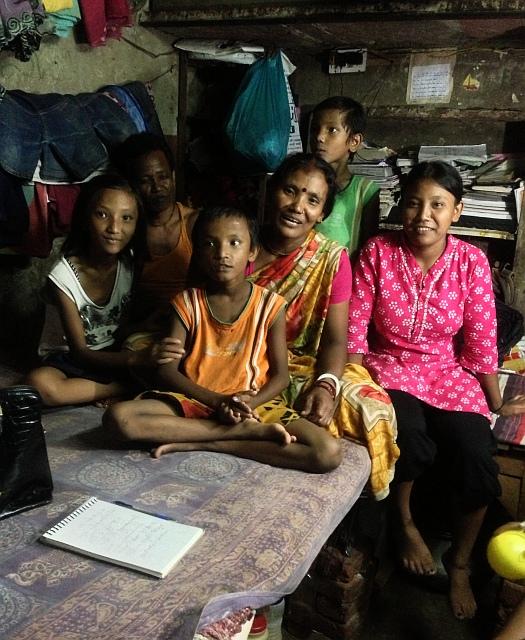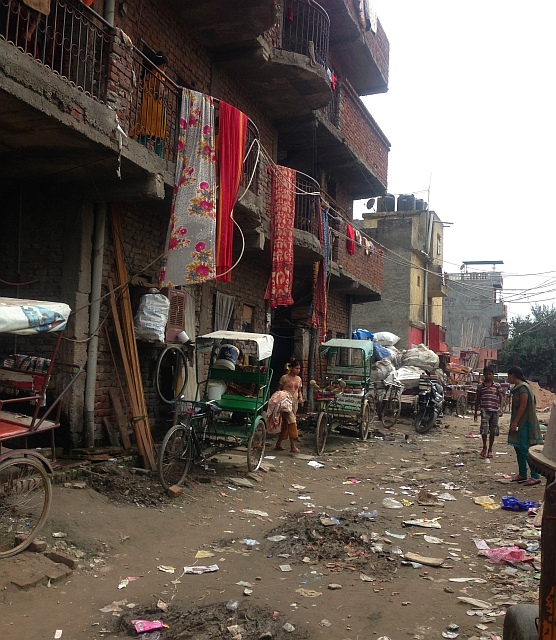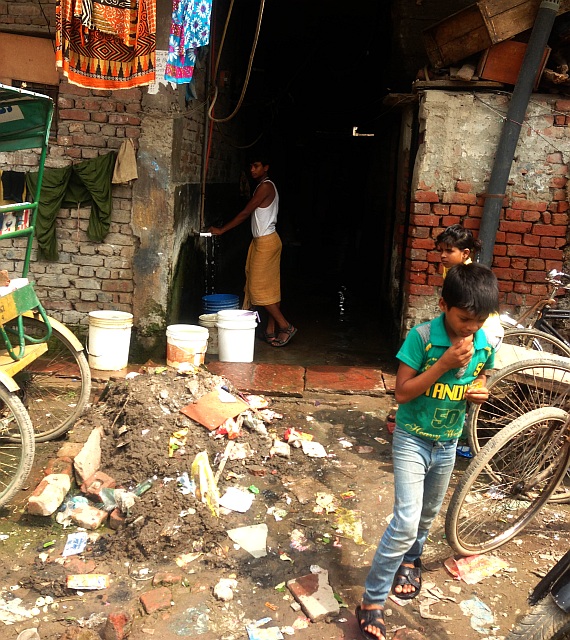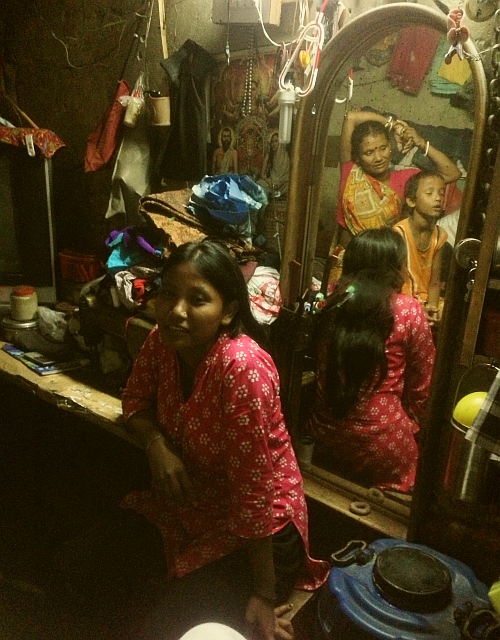Photographs: Sheela Bhatt
Sheela Bhatt finds hope for the ordinary Indian in an unlikely place -- a Delhi slum.
Photographs: Sheela Bhatt
Again? Why are you always late?”
“Madam, my younger child has fever. I took him to the doctor.”
“You are always lying.”
“No, madam, I am not lying. You can visit my house and check.”
Deepali Devising, originally from Malda, West Bengal, narrates her deep angst at the "beizzati (dishonor)” she faces regularly at her workplace -- four homes in east Delhi’s Vasundhara Enclave, where she cooks twice a day.
She sits in her home, a dark, dingy and dirty room in New Ashoka Nagar in Mayur Vihar, Phase III, to reach which one has to cross the swanky toll bridge over the Yamuna river.
Decades ago, the Gujjar community dominated the peripheral villages of New Delhi. Now, the villages are part of India’s National Capital Region.
Many Gujjar landowners, with help of local politicians, goons and bureaucrats, have built hundreds of illegal slum colonies over the last 50 years. They don’t provide any ‘facilities’ to their poor tenants.
Deepali considers herself very lucky to live in one such ‘building’, built without any engineer, architect or expert’s advice.
Of course, there is no approval or any certificate from any government agency to suggest that the ‘building’ is fit for people to stay in.
It’s just bricks and cement, piled up without any plan. The walls have no plaster. The rooms have no windows. No bathrooms. The floor is uneven.
The stench and dirt in the ‘colony’ gives mosquitoes, ants, flies, rats, cats and stray dogs food and a place to live. There is electricity, obviously illegal.
...
'Abhi guzara hota hai'
Image: The slum where Deepali and her family live.Photographs: Sheela Bhatt
South Delhi, where Delhi’s rich and upper middle classes live, gets its cooks, drivers, maids, vegetable vendors, laundrymen, etc, from largely Gujjar-owned slums like these.
The average Delhiites -- read those who have five air-conditioners and five cars on an average -- ignore these slums. They’re illegal aren’t they?
But without these filthy slums, India’s capital will be an even bigger urban disaster. And people like Deepali will have nowhere but the streets to live.
On the streets is where Deepali and her family used to live 15 years ago. She feels she is much better off now. “Abhi guzara hota hai (Now we at least get by),” she says with a hint of pride.
Compared to her tragic past, her present ‘apartment’ is not so ugly to her. The more than 100 (mostly Bengali) migrants who live in her ‘building’ bathe, defecate and wash their clothes and utensils in front of their rooms.
Obviously, there is no sewage system, so dirty-water-logging is a perennial problem. And the garbage has been piling up at the entrance of the ‘building’ for years.
The stench hits you like a dirty bomb.
Ask her over and over again how she feels living in these sub-human conditions and Deepali points out over and over again how heart-wrenching were her days when she arrived on the footpaths of New Delhi from her village.
...
'He is managing lunch for my four children'
Image: Deepali sits down for a meal with her husband (right)Photographs: Sheela Bhatt
Deepali, her husband Shukil and Shipra, their older daughter, survived a past Deepali is unable to forget.
The only time her eyes glisten with unshed tears is when she tells you of the time she was pregnant with a second child.
Her husband was jobless. All they had was Rs 1,600. There were medical complications.
The cost of delivery of the baby was Rs 10,000. Deepali and her family were living mostly on the pavements, or at some relative’s home if and when allowed to.
“When I was resting in the hospital bed after the birth of my second baby, my husband was so worried,” Deepali says. “I will never forget his face on that day. We had no money to pay for my delivery. That broke my heart. That day we were nervous about our future in Delhi."
"Even today, I am unable to bear my husband’s pain in those critical moments. How impossible it was to pay for my delivery.”
Her husband took a loan at a rate of 84 per cent per year so that the mother and baby could be discharged from the private hospital.
The free government hospital had advised them to go to a private hospital because of complications in her pregnancy.
Deepali thinks she is much better off these days with income coming from four houses where she cooks and two homes where she does cleaning and mopping work.
Her husband, an unskilled worker, doesn’t have a job. Once in two blue moons, he gets some tailoring work or earns a daily wage as a temporary rickshaw driver. Most of the time, he is at home.
Deepali is positive about and even protective of her husband. “He is managing lunch for my four children,” she says, smiling. She works longer hours than a techie at Infosys; she is more punctual than a smart crew member on a private Indian airline.
...
'It's tough to maintain time'
Image: The entrance of Deepali's buildingPhotographs: Sheela Bhatt
“I get up at 5.30 in morning,” she explains her routine. “I can’t get out of bed easily, but by 6.30 I leave home. It’s a 30-minute walk to reach the first workplace, a house where I make breakfast, by 7. The employer is a kind woman; they have offered me breakfast and tea that I make for them. But at the three other places where I cook for so many years, I don’t eat. They have never offered me food.”
She gets Rs 1,200 per month for two cleaning jobs and Rs 2,200 for cooking twice a day.
“It’s tough to maintain time,” she says. “After preparing breakfast I go to the next house at 7.30 to 7.45 am. Then another one at 9.15. It takes an hour to cook Dal-Roti-Chawal and subzi for three to four people. The chicken dishes and fish preparation in Bengali style take more time.”
She takes pride in her work. “I can cook all kinds of Indian food,” she says. “I make Besan Ka Gatha, Idli, Sambar… I learned to cook Thai food, but didn’t manage to get a grip on it.”
Around noon, she goes to her fourth cooking job.
“I complete cooking for four families by 2 pm. In between, I clean two homes too,” she says.
Around 2:30, she comes home. She eats what Shukil has cooked. Today, he had cooked rice and potatoes, Bengali style.
“He bought potatoes for Rs 25 per kilo,” she rues. “Who’s afraid of hard work? But the money is not enough.”
Sewa Rural, a non-governmental organisation started by Ela Bhatt in Ahmedabad, has a branch near Deepali’s home. She has joined it, but it still doesn’t give her the heft to press her employers for a raise: “Everybody tells me that they will increase the salary when Diwali comes.”
In emergencies, she uses her Sewa Rural membership to get bank loans.
After lunch, she attends to her children. By 4 pm she is out for work again. She returns home around 9.30 pm. Every day at 10:30 pm, she makes breakfast -- Parathas -- for the next day for her family of six. “Rotis don’t stay fresh in Delhi’s summer, so Parathas are better to keep overnight.”
She says many people, including her children, say they should move to a better room. That will cost a minimum of Rs 3,000 plus electricity fees. She has too many priorities and emergencies to be able to afford that kind of rent.
She hardly has savings. She wears a string of tulsi around her neck -- a sadhu gave it to her, along with a mantra, when she got married. “The mantra is secret. I chant it every day,”
She takes a loan and spends money only when she goes to her home in Bengal once in three or four years, or when Durga Puja comes. Else, she just cooks. Seven days a week.
Her only complaint is at the high price of food and education.
...
'My daughters should never become maids or cooks'
Image: Deepali's eldest daughter Shipra in a candid momentPhotographs: Sheela Bhatt
In her ‘colony’, tuition fees for spoken-English classes are Rs 400 for six months. “It’s too high,” she says. “I pay Rs 1,500 as rent and Rs 1,100 for electricity. I have a second-hand television and an air-cooler (which she bought from her employers). I also have a gas stove and gas cylinder.”
The stench and the squalor around her is enough to numb your senses, but Deepali has a laser-like focus: Education for her children.
Education is power, she understands. It’s hope -- the fuel that runs her life. She thinks education will take her children from darkness to light.
She ensures that Shipra studies. Her younger daughter, Kakoli, takes tuition.
She also closely monitors her twin sons, Amit and Ashish. She has deputed her husband to see that the children do not ignore their education when she is away for most of the day working.
Her employers are upper middle class or rich. They constantly complain about timing, she says, and hurl allegations without thinking about her feelings.
“It’s difficult to get even three or four days leave in a month,” she says. “You have no idea what happens to me when I take off.”
She says she feels sleepy all the time. But she never gets the time to sleep enough.
What fortifies her against abuses at work, she says, is her satisfaction at being able to give her children some education.
They study in government schools, but she says with pride that they go to private tuition classes.
Her mood swings are linked to her children’s studies.
When they don’t study she gets furious; nothing makes her happier than when they get good marks.
Shipra understands her mother’s mood swings. She got 66 percent in her Class 10. She is studying economics in Class 11.
“I understand everything,” Shipra says with the premature awareness about life’s harsh realities that poverty brings.
“I will prove my mother right one day. I want to study and earn money to make her comfortable.”
The Delhi government gives a grant of Rs 800 per year to poor students to buy books after Class 8. After Class 11, it is Rs 1,500.
The grant, Shipra says, comes almost after nine months of the academic year.
Deepali has no time, but she has hope for the future.
“I only know one thing,” she declares. “If I would have been in our village Narayanpur, Shipra would have been uneducated. I am ready to do whatever it takes to educate my children. Shipra will get a good job. I will have better times. My daughters should never become maids or cooks.”
“You will not have to clean other people’s leftovers if you are educated. I work hard to ensure that they get a life of honor. I tell Shipra, I never got respect from my employers, but you can earn respect in society -- if you study.”






article